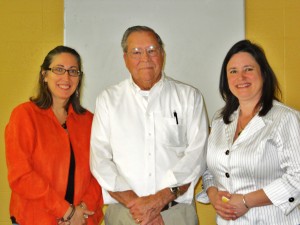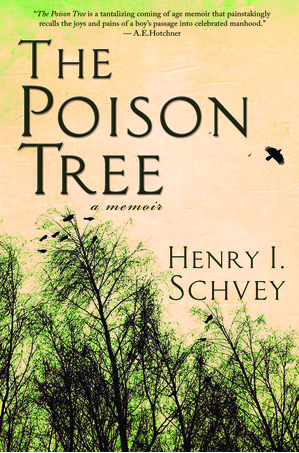Small Publishers Panel Speaks at St. Louis Writers Guild
Share the post "Small Publishers Panel Speaks at St. Louis Writers Guild"
Small Publishers Panel Speaks at St. Louis Writers Guild
By Diana Davis, Walrus Contributor

Kristina Blank Makansi, Bill Adams, Lisa Miller
On Saturday, April 7, 36 writers of all levels and genres came to the Kirkwood Community Center to meet representatives of three small publishing companies in the St. Louis area: our own Lisa Miller, owner of Walrus Publishing; Bill Adams, owner of Fountain City Publishing; and Kristina Blank Makansi, partial owner of Blank Slate Press. They all offered tips for writers who want to get the editors to notice their work.
Miller, who holds an M.A. degree from University of Missouri-St. Louis, started Walrus Publishing in 2008, following 15 years as a tech writer, a stint working for Ligouri Publications and several years of teaching. When she reevaluated her talents, she decided that she was “damn good as an editor,” so she formed Walrus Publishing, an endeavor that brings much satisfaction. She loves St. Louis because it’s “ripe with history and is at the confluence of literary endeavors.” Everyone laughed when she admitted that she loves our city so much, she lies about where she went to high school. Her publishing company is geared towards authors who are from the St. Louis area or who write about St. Louis. Her goal is to connect area readers and writers.
Her advice to writers? Miller emphasized several things. If a publishing company asks you for money upfront—RUN! Reputable publishers do not ask for money up front. She further explained that it takes about three years to get your book published from the time of your original inquiry to the time when your book is in the bookstore with a bar code on it. It will take another year before you see the any profits from your sales.
How does she select a book? Judging from the query letter, synopsis and extract, she decides if the author has a good St. Louis story; therefore, carefully proofread your initial inquiry. Next, she looks at plot, characters, and conflict; then, she looks for a distinct writing style. If she likes what she sees, she schedules a lunch with the author to see how they will get along. She shows the writer a contract and they must agree on (1) editing, (2) proofreading, (3) design, (4) promotional events, and (5) royalties. Since the writer and the publisher are going to be in close contact for several years, it is imperative that their personalities mesh well. She also touched on a reason to avoid self-publication: marketing is the problem. If you are a talented writer, you are better off being creative and letting the publishing house handle the financial and promotional end.
Adams from Fountain City Publishing, was a chaplain with the Civil Air Patrol and a computer whiz when, in 2003, his wife, Faye, a talented poet and short story writer, asked him to help publish her poetry. He has published 18 or 19 books for her and her friends in the years since. Adams is not taking on new writers now, although he will handle reprint requests from writers whom he has served in the past.
Adams stated, emphatically, that writers need to operate on a professional level. They must adhere to guidelines to have a chance at getting published. He and his wife, Faye, were asked recently to judge a contest. They received 600 entries. First, they went through the submissions to see if the guidelines were met. Fully one half of all submissions went into the “round file cabinet” (the trash can) because the poets failed to follow directions. Don’t be one of those people whose wonderful creative work is never considered because they failed to submit in the proper format. When Adams reads, if you do not get his attention in the first paragraph, the work also goes into the trash. His wife, Faye, does all the editing; she’s the best editor he’s ever seen. They publish hard-back books only, but they have never made a profit from publishing.
Kristina Blank Makansi, from Blank Slate Press was the final speaker. She and her two business partners have been in the publishing industry for two and a half years and have three books to their credit. She also claims to be a bit snarky. She stated in addition to following the guidelines, you also need to invest in a computer system compatible with your publisher’s equipment. If you are going to become a professional, you have to invest in Microsoft Word. Know your publishing companies. Do not approach a cozy story editor with a piece of erotica. Don’t send poetry to folks who publish novels. Even after you publish, know that neither the author nor the publisher will get rich quickly.
Blank Slate Press has a goal of being the company that takes a debut novelist and launches him/her into the St. Louis market, and then, beyond into the world. They want to be able to say about a famous writer, “We launched that guy.” The company is genre blind, looking only for literary sensibility. Her other advice:
- If you want to be published, write and write more.
- Don’t worry about a bad first draft–all first drafts are bad.
- Write until the end, then go back and revise.
- You can never edit your own work. Before you send even a query letter or a submission, let somebody else look it over.
- Never believe your mother when she tells you that you’ve written a work of staggering genius.
- If you want to be published, you are a masochistic person who loves rejection,but hope springs eternal.)
The presentation was well received by the crowd. Brad Cook, St. Louis Writers Guild President says, “I had a blast; thought it was a great presentation showing the publishers’ view of the industry which differs from the writers’ view.” David Alan Lucas agrees, “It was fantastic for any author and shows how the small presses are a viable option for publishing.”
Published author Butch Drury, the head of Rivendell Publishing, sums it up wisely: “Your relationship to a publisher is somewhat like a marriage made in heaven. If you do not grab his/her attention on the first date, or first page of your manuscript, or in other words, he/she does not fall head over heels in love with your book, your love may be rejected, even though it may be a perfectly good book. This rejection, though painful, may mean (a) you haven’t found the right match yet or (b) you never will because your expectations are unreal or (c) you do not express yourself well enough yet to be immortalized as a published writer.”


